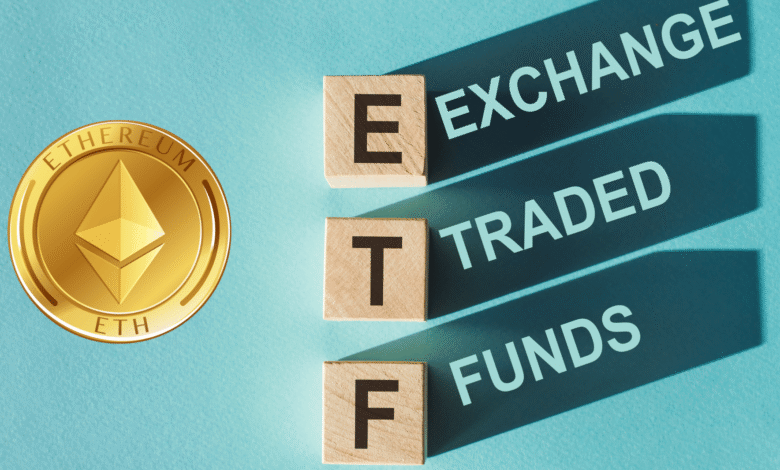Ethereum ETF UK, What It Means for Traders and Investors?

The approval of Ethereum Exchange-Traded Funds (ETFs) in the United States has created ripple effects across global financial markets, fundamentally changing how institutional and retail investors can access exposure to the world’s second-largest cryptocurrency. For UK traders, these developments present both immediate opportunities and an evolving regulatory landscape that could reshape cryptocurrency investment strategies in the coming years.
The U.S. Securities and Exchange Commission (SEC) approved applications from Nasdaq, CBOE and NYSE to list exchange-traded funds (ETFs) tied to the price of ether, with trading beginning on major American exchanges, including Nasdaq, the New York Stock Exchange, and the Chicago Board Options Exchange, starting July 23, 2024. This landmark approval follows the successful launch of Bitcoin ETFs earlier in 2024, signaling an increasing global regulatory acceptance of digital assets as legitimate investment vehicles.
Current UK Regulatory Landscape for Crypto ETFs
The Financial Conduct Authority (FCA) has undergone a significant shift in its approach to cryptocurrency-backed investment products. Having previously opposed the idea of listed securities backed by cryptocurrencies, the FCA appears to be shifting its stance. This regulatory evolution directly impacts how UK traders can access Ethereum and other cryptocurrency investments through regulated financial products.
Professional vs. Retail Access
Currently, the UK operates under a two-tier system for cryptocurrency investment products:
- Professional Investor Access: Britain’s financial watchdog has approved the launch of crypto-backed exchange-traded notes for professional investors, becoming the latest regulator to permit digital asset products while seeking to protect retail investors. Professional investors, including institutional clients and high-net-worth individuals, can already access Ethereum ETNs through regulated UK exchanges.
- Retail Investor Developments: The FCA announced plans to lift the ban on retail investors buying crypto exchange-traded notes (ETNs), provided they are traded on an FCA-approved investment exchange. This represents a significant policy shift that could democratize access to Ethereum investment products for individual UK traders.
Exchange-Traded Notes vs. Exchange-Traded Funds
Regulatory conditions in Europe prohibit the offering of an exchange-traded fund (ETF) for a single asset, such as Bitcoin (BTC) or Ether (ETH). Ethereum vs BNB Chain, This makes ETNs the preferred exchange-traded product (ETP) in the European Union and the United Kingdom. Understanding this distinction is crucial for UK traders evaluating their investment options.
Key Differences:
- ETFs: Pooled investment vehicles that hold underlying assets directly
- ETNs: Debt securities that track the performance of underlying assets without direct ownership
- Risk Profile: ETNs carry additional counterparty risk compared to ETFs
- Regulatory Treatment: ETNs face different capital requirements and investor protection measures
Impact of US Ethereum ETF Approval on UK Markets
The approval of the US Ethereum ETF has created substantial market momentum that extends beyond American borders. Bloomberg analysts reported that the SEC’s imminent approval on Monday, May 20, has caused the Ethereum price to skyrocket by 25%, adding over $90 billion to its market capitalization in the process. This price appreciation directly benefits UK traders holding Ethereum positions across various platforms and investment vehicles.
Institutional Adoption Acceleration
The introduction of Bitcoin ETFs in January 2024 set a precedent that significantly impacted the market, increasing investor confidence and driving substantial inflows into the digital asset space, with Bitcoin ETF inflows reaching around $58 billion. The Ethereum ETF approval is expected to generate similar institutional interest, creating increased liquidity and market depth that benefits UK traders through:
Enhanced Market Liquidity:
- Improved bid-ask spreads across cryptocurrency exchanges
- Reduced price volatility during large transactions
- Better execution quality for both retail and institutional orders
Price Discovery Mechanisms:
- More efficient price formation through increased institutional participation
- Reduced market manipulation through higher trading volumes
- Better arbitrage opportunities across global exchanges
Cross-Border Investment Opportunities
UK traders can potentially benefit from US Ethereum ETF approval through several channels:
Direct Investment Routes:
- International brokerage accounts offering access to US-listed ETFs
- Synthetic exposure through CFDs and derivative products
- Cross-listed products that may emerge on UK exchanges
Indirect Market Effects:
- Improved global Ethereum liquidity benefiting UK cryptocurrency exchanges
- Enhanced institutional confidence in Ethereum as an asset class
- Potential for similar regulatory developments in the UK market
UK Trading Platforms and Ethereum Access
Current Investment Options for UK Traders
UK traders currently have several avenues for Ethereum exposure, each with distinct characteristics and regulatory considerations:
Direct Cryptocurrency Purchases:
- Regulated UK cryptocurrency exchanges (Coinbase UK, Kraken UK, Binance UK)
- Peer-to-peer trading platforms
- Direct wallet holdings with full custody control
Derivative Products:
- Contracts for Difference (CFDs) offered by FCA-regulated brokers
- Futures contracts through authorized derivatives exchanges
- Options products for sophisticated hedging strategies
Professional Investment Products:
- Ethereum ETNs are available to qualified professional investors
- Structured products offered by investment banks
- Managed cryptocurrency funds and investment trusts
Emerging Regulatory Framework
The FCA is separately working through a detailed roadmap of consultations and discussion papers with a view to implementing a regulatory regime for crypto by 2026. This comprehensive regulatory framework will likely include:
Consumer Protection Measures:
- Enhanced disclosure requirements for cryptocurrency investments
- Minimum capital requirements for cryptocurrency service providers
- Compensation scheme coverage for regulated cryptocurrency products
Market Infrastructure Development:
- Standards for cryptocurrency custody services
- Requirements for market making and liquidity provision
- Integration with existing financial market infrastructure
Investment Strategies for UK Traders
The approval of Ethereum ETFs globally suggests increasing institutional acceptance of cryptocurrency as a legitimate asset class. UK traders should consider several factors when incorporating Ethereum exposure into their portfolios:

Risk Assessment Framework:
- Correlation analysis with traditional asset classes
- Volatility metrics and downside protection strategies
- Liquidity requirements and redemption timelines
Diversification Benefits:
- Ethereum’s role as a technology platform versus store of value
- Smart contract ecosystem growth and adoption metrics
- Decentralized finance (DeFi) integration opportunities
Timing and Market Entry Strategies
Dollar-Cost Averaging (DCA):
- Systematic investment approach to reduce timing risk
- Benefit from volatility through consistent purchasing
- Suitable for long-term investment horizons
Technical Analysis Applications:
- Support and resistance level identification
- Momentum indicators for entry and exit timing
- Volume analysis for confirmation of price movements
Fundamental Analysis Integration:
- Ethereum network usage metrics and transaction volumes
- Developer activity and ecosystem growth indicators
- Institutional adoption rates and regulatory developments
Tax Implications for UK Traders
Current UK Tax Treatment
UK traders must navigate complex tax obligations when investing in Ethereum, whether through direct holdings or regulated investment products:
Capital Gains Tax (CGT):
- Annual exemption allowances for cryptocurrency gains
- Different treatment for trading versus investment activities
- Record-keeping requirements for cost basis calculations
Income Tax Considerations:
- Treatment of staking rewards and DeFi yield
- Professional trading designation and business income
- Allowable expenses and deduction opportunities
Future Tax Developments:
- Potential changes to cryptocurrency tax treatment
- Integration with traditional investment product taxation
- Regulatory clarity on new investment vehicle structures
Risk Management and Due Diligence
UK traders must carefully evaluate regulatory risks associated with Ethereum investments:
Current Regulatory Gaps:
- Limited investor protection for unregulated products
- Uncertainty around future regulatory changes
- Cross-border regulatory compliance requirements
Mitigation Strategies:
- Focus on FCA-regulated investment products where available
- Diversification across multiple regulatory jurisdictions
- Regular monitoring of regulatory developments and compliance requirements
Operational Risk Management
Custody and Security:
- Cold storage solutions for direct cryptocurrency holdings
- Insurance coverage for cryptocurrency investments
- Multi-signature wallet configurations for enhanced security
Counterparty Risk:
- Due diligence on cryptocurrency exchange operators
- Regulatory status verification for service providers
- Segregated client asset protection measures
Future Outlook and Strategic Positioning
The U.K. regulator is launching a consultation on allowing individual investors to buy crypto ETPs, provided they are listed on an FCA-approved exchange, such as the London Stock Exchange (LSE). This development could significantly expand access to Ethereum investment products for UK retail traders.
Expected Timeline:
- Consultation period completion and feedback analysis
- Implementation of new regulations by 2026
- Gradual rollout of retail-accessible cryptocurrency ETPs
Market Preparation:
- Exchange infrastructure development for cryptocurrency ETPs
- Product development by asset management companies
- Investor education and awareness programs
Long-Term Investment Thesis
The global approval of Ethereum ETFs strengthens the long-term investment case for the cryptocurrency:
Technology Adoption Drivers:
- Ethereum’s role in decentralized finance (DeFi) ecosystems
- Non-fungible token (NFT) market development
- Enterprise blockchain adoption and integration
Institutional Infrastructure:
- Professional custody solutions and insurance products
- Sophisticated trading and risk management tools
- Integration with traditional portfolio management systems
Strategic Recommendations for UK Traders
Immediate Actions:
- Monitor FCA regulatory consultations and policy developments
- Evaluate current Ethereum exposure and portfolio allocation
- Consider professional investor qualification for expanded product access
Medium-Term Positioning:
- Prepare for potential retail ETP availability
- Develop comprehensive risk management frameworks
- Build relationships with regulated cryptocurrency service providers
Long-Term Strategy:
- Maintain flexibility for the evolving regulatory landscape
- Focus on educational development and market understanding
- Consider the geographic diversification of cryptocurrency investments
Summary
The approval of Ethereum ETFs in the United States marks a significant milestone for cryptocurrency adoption and global regulatory acceptance. For UK traders, these developments signal both immediate opportunities and evolving market dynamics that will reshape cryptocurrency investment strategies over the coming years.
While UK traders currently face regulatory restrictions on direct access to cryptocurrency exchange-traded funds (ETFs), the FCA’s evolving position and planned regulatory framework suggest that expanded investment options are on the horizon. The global institutional acceptance of Ethereum as a legitimate asset class, as demonstrated by ETF approvals, creates positive momentum that benefits all market participants through improved liquidity, enhanced price discovery, and enhanced market infrastructure.
UK traders should focus on understanding the evolving regulatory landscape, maintaining appropriate risk management practices, and positioning themselves to capitalize on expanded investment opportunities as they become available. The intersection of technological innovation, regulatory clarity, and institutional adoption creates a compelling environment for informed cryptocurrency investment strategies.
As the cryptocurrency market continues to mature and integrate with traditional financial systems, UK traders who understand these dynamics and prepare accordingly will be best positioned to benefit from the long-term growth potential of Ethereum and the broader digital asset ecosystem.
FAQs
Q1. What does the US approval of Ethereum ETFs mean for UK traders?
Ans: It opens global investment momentum and hints at possible regulatory easing in the UK for retail Ethereum access.
Q2. Can UK retail investors buy Ethereum ETFs right now?
Ans: Not yet—retail access is restricted, but the FCA plans to lift the ban by 2026 via approved exchanges.
Q3. What’s the difference between an ETF and an ETN for Ethereum?
Ans: ETFs hold the asset directly; ETNs are debt securities that track it, carrying more counterparty risk.
Q4. How does the Ethereum ETF impact UK crypto market dynamics?
Ans: It boosts liquidity, price discovery, and institutional confidence, indirectly benefiting UK platforms and investors.
Q5. Are there tax implications for UK investors in Ethereum products?
Ans: Yes, UK traders must consider Capital Gains Tax, income from staking, and evolving crypto tax guidelines.
